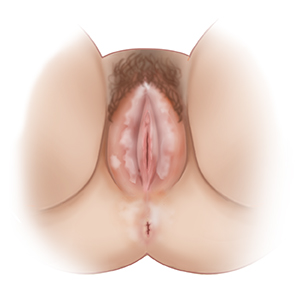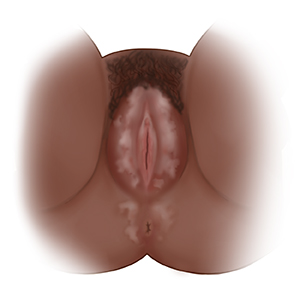Understanding Lichen Sclerosus
Lichen sclerosus is a long-term (chronic) skin condition. It causes white patches to form on the body. These most often affect skin around the genitals and anus. But they can appear anywhere, even in the mouth. The condition is more common in women who have gone through menopause and young girls who have not gone through puberty. It also tends to occur in men who are not circumcised. This disorder is not contagious. It's not a sexually transmitted infection.
How to say it
LY-ken skluh-ROH-sus
What causes lichen sclerosus?
Experts don’t yet know exactly what causes lichen sclerosus. It may be an autoimmune disease. That’s when the immune system attacks healthy parts of the body, such as the skin. It may also be linked to genetics, hormones, or some infections.
Symptoms of lichen sclerosus
 |
| Lichen sclerosus on light skin. |
 |
| Lichen sclerosus on dark skin. |
Lichen sclerosus causes white patches on the skin. These patches break down the skin. The skin may become thin, wrinkled, and cracked. It can be itchy and painful. The patches may scar, discolor, and disfigure the skin. These changes can damage the skin. In most cases, the patches appear around the vagina and on the penis. Genital lesions can be very itchy or sometimes painful. Skin breakdown or scarring may lead to problems having sex and using the bathroom. In some cases, the patches are found on the back, shoulders, neck, wrist, thigh, and breast areas. They may also appear on the lips or in the mouth.
Treatment for lichen sclerosus
Treatment can ease symptoms and prevent scarring. It should be started early to prevent lasting (permanent) damage to the skin. Care from a healthcare provider who specializes in lichen sclerosis is recommended. Treatment choices include:
-
Skin care. Bathing with mild soaps and using moisturizing cream may ease itching.
-
Steroids. These medicines are often put on the skin as an ointment or cream. Very strong, prescription steroid creams are used. Your provider may also inject these into the white patches in severe cases.
-
Other medicines. An oral medicine (antihistamine) may be given to ease itching. Other creams or ointments are also available if a steroid doesn’t work.
-
Phototherapy. This treatment directs ultraviolet light on the skin to help clear it.
-
Surgery. This treatment helps with scarring and skin disfigurement. Men may benefit from circumcision if they haven’t yet had it done.
Possible complications of lichen sclerosus
For more information
For more help with managing this chronic skin condition, go to:
Online Medical Reviewer:
L Renee Watson MSN RN
Online Medical Reviewer:
Marianne Fraser MSN RN
Online Medical Reviewer:
Michael Lehrer MD
Date Last Reviewed:
3/1/2022
© 2000-2024 The StayWell Company, LLC. All rights reserved. This information is not intended as a substitute for professional medical care. Always follow your healthcare professional's instructions.